Sunday Feb 22, 2026
Sunday Feb 22, 2026
Wednesday, 27 May 2020 01:14 - - {{hitsCtrl.values.hits}}
By Medha de Alwis
What is the viewpoint of the economy post COVID-19 from homegrown entrepreneurs? The Chamber of Young Lankan Entrepreneurs (COYLE), under the leadership of Chamath Kottage together with the Daily FT, recently invited three popular “Made in Sri Lanka” brands and entrepreneurs to share key insights to this important issue through a webinar. The trio were Laugfs Holdings PLC Chairman W.K.H. Wegapitiya, Epic Technology Group Chairman Dr. Nayana Dehigama, and Nature’s Beauty Creation Chairman Samantha Kumarasinghe. Daily FT Editor Nisthar Cassim moderated the webinar.
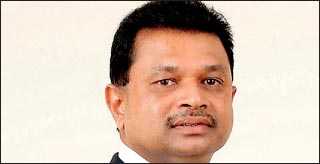 |
| Laugfs Holdings PLC Chairman W.K.H. Wegapitiya |
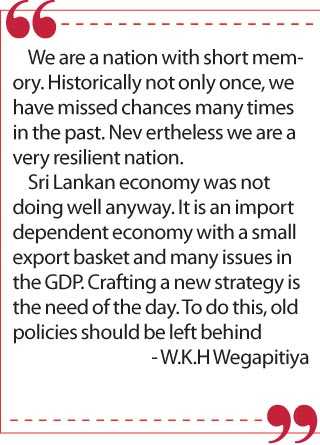 |
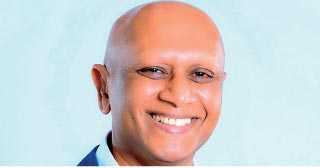 |
| Nature’s Beauty Creation Chairman Samantha Kumarasinghe |
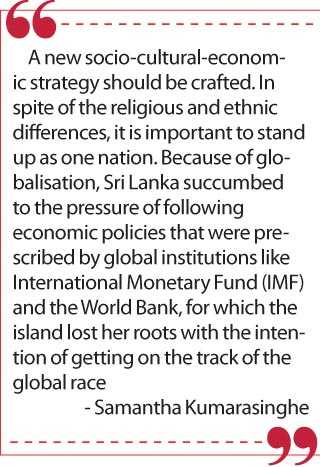 |
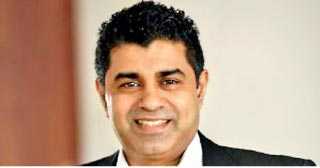 |
| Epic Technology Group Chairman Dr. Nayana Dehigama |
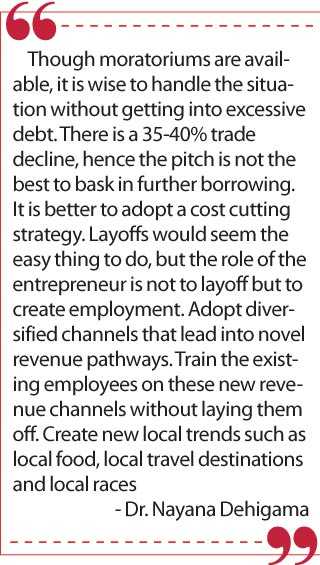 |
Wegapitiya said that it was too early to gauge how the future would look like. Yet, he said, following global financial crises, the conventional business models became obsolete, and new innovations came up. Enterprises are the live wire of the entire economy creating wealth for the entire society. Moving forward from COVID-19, the industries have to understand how the previous global crises were managed.
Wegapitiya took a strong stand that we were not normal, prior to COVID-19. The human race was leading towards an absolute destination. Economic supremacy was the norm of the day and the powerful nations showed their muscles to developing nations. This trend has changed at present. Currently, for every society, economy is not the first. The wellbeing of the economy has become more important. The Chairman of Laugfs Holdings went on to elaborate that there are four pillars in any society, namely: a) economic pillar b) social pillar c) environment pillar and d) cultural pillar.
Sustainable development
The economic pillar represents the economies and finance in the society. The social pillar embodies salient features such as freedom of expression, health, education, law and order. The environmental pillar embodies preservation of the environment including safeguarding air quality, water quality and the manner in which goods and services are produced without disturbing the balance of the environment.
In the recent past, these four pillars were unbalanced, said Wegapitiya. The society focused mostly on the economic pillar, at the expense or neglect of others.
To drive home his point, he cited the example of a large number of patients in the North Central province suffering from kidney disease. Another was the Easter Sunday terror attacks, the crisis that followed, and cultural extremism.
Shifting his focus to the global arena, Wegapitiya said: “Six months ago China and the USA competed for economic supremacy in Asia. All over the world, these kinds of challenges compel society to drive their journey towards a different destination, which may not be a safe destination.”
He said before trying to understand the post COVID-19 economy, it was vital to know that Sri Lanka wasn’t normal prior to COVID-19. “It is foolish to talk about getting back to normalcy,” said Wegapitiya, adding that the former priorities of economic gain, management priorities, and political behaviour have to be forgotten, and new norms of socially beneficial, resourceful citizenship and entrepreneurship are the new way to go forward.
He said it was interesting to note how both SriLankan Airlines staff and the Army had to double up as para-health workers. A new dimension has to be adopted, in which the citizen does not want to go back to the ‘normalcy’ that was in the past.
Wegapitiya explained three shocks that have arisen during the COVID-19 pandemic, are likely to continue in the post COVID-19 era too. They are:
Samantha Kumarasinghe said that since the Second World War, what has been in effect is the neo-liberal economic policy. The brainchild of the London School of Economics in 1945, it concentrated on a few people getting rich, and most people staying poor. The poor US citizens dying on the street is a result of this, as per Kumarasinghe, because the poor segment of any society as well as the developing countries have been manipulated for the advantage of the rich.
Kumarasinghe went on to explain that nature was the most powerful. “When nature takes over, there is no way how it can be controlled. We have not been normal,” he opined, adding that the pre-COVID-19 era was a system in which greed was facilitated. Post COVID-19, he expressed the confidence that different social values, behaviours, and economic models will be brought forward. “Neither the economy nor society will ever go back to what it had once been,” he emphasised.
Dr. Dayana Dehigama said that the webinar discussion was pragmatic, as the panel comprises of entrepreneurs who have hands-on experience on the situation.
He agreed with the other two panellists that the economy as well as society has missed the bus by miles by concentrating solely on the competitive race.
Dehigama stated that there is a difference between wealth and value creation at the cost of destroying our own valuable industries. Sri Lanka has become an import-dependent nation. He stated that dhal and bread are the unofficial staple food in the island, which exemplifies what an import-dependent economy Sri Lanka has become.
Dehigama further stated that the reason for getting into such dependence was too much focus on comparative advantage, though what is important is to create value and not only wealth. As the economy cannot enjoy the economies of scale, import culture has been established, thereby not accruing the proper place to the concept of value creation.
“Value comes in a critical situation like this to help ourselves and stand on our own feet. We have been facing similar crisis situations in the past. In the period between 2000 and 2009 there were many crises. Political crisis where the Government changed thrice. Worst economic situation, intensified civil world, Asian economic crisis, global economic crisis. Yet, that was the time most of the entrepreneurship have gained growth. Some got over 40% growth at that time. Opportunities came up in crisis markets,” expressed Dehigama, who was of the belief that crises are opportunities for businesses to thrive. “Sri Lanka will adapt very smoothly, no need to be stressed. The country will understand what has be to done and will take it up positively as nation,” added Dehigama further.
Best opportunity
Answering the question of whether the post COVID-19 era was an ideal opportunity for Sri Lanka to make it right, and as to whether this opportunity too would be missed as the previous ones, Wegapitiya replied, “We are a nation with short memory. Historically not only once, we have missed chances many times in the past,” adding "we are a very resilient nation, nevertheless."
Coronavirus tested how tensile the nations and the economies are. The US and European economies were regarded as great economies who create economic fundamentals and policies. But the virus shattered it all. Economies have been running behind selfish economic objectives. Because of such recklessness, economies have come to a halt. Now is the time for not only the Government, but also entrepreneurs and citizenry to be responsible and make the correct decisions for the future. Sri Lanka made tea using artificial chemicals, taking the environment for granted. Due to COVID-19, the majority of exports such as apparel, tea and rubber have stopped. These are all conventional goods. It is sad that Sri Lanka did not export industrial goods. It is time to change in the post COVID-19 phase. To do this, a new socio-cultural-economic strategy should be crafted.
Kumarasinghe said in spite of the religious and ethnic differences, it is important to stand up as one nation. Because of globalisation, Sri Lanka succumbed to the pressure of following economic policies that were prescribed by global institutions like the International Monetary Fund (IMF) and the World Bank, for which the island lost her roots with the intention of getting on the track of the global race.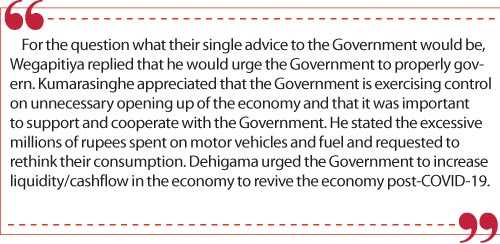
He also emphasised that a strong hand needs to be lent to local entrepreneurs. Sri Lanka is not independent of the colonial mentality. Foreign investors are treated well. As much as it should be the case, in order to bring in foreign direct investment, it is wise to bear in mind that if foreign investment only provides citizens with employment, there is no growth for the island; and it is still colonisation.
Due to the pressure of the Institutions like the IMF and the World Bank, even the Sri Lankan Government formulated policies which are for the benefit of multinationals and foreigners. There is little benefit to the locals at large. This system has to change post COVID-19. If one feels that being a member of the Commonwealth does not serve a purpose, one should get out of the Commonwealth. Britain has taken the wealth out of Sri Lanka; and as per Kumarasinghe, there is no reason to have any further alliance with Britain or the Commonwealth.
Kumarasinghe further explicated that the Indo-Sri Lanka Free Trade Agreement of 1998 was designed for the benefit of multinational companies, not Sri Lankans. “These are the errors that were made in the modern economic history of Sri Lanka. In following with the Indo-Sri Lankan Free Trade Agreement, the Government had given a tax benefit to a non-Indian product, as it came through India. The said non-eligible company used the said source of income to kill local competition.”
The Government has to be independent in its approach and look afar. Kumarasinghe recalled that in February 2019, a duty fraud by a multi-national company was exposed. Still the Government has not been able to recover the fraudulent money.
Right policy mix
The moderator posed the question of how Sri Lanka should strike a balance, since these three companies featured in the webinar were also foreign investors in other countries in Asian region.
Kumarasinghe, who has invested in a manufacturing plant in Vietnam, said Vietnam supports foreign companies for 100% export, whilst in the local market preference is given for domestic companies. “We need to adapt a strong policy which addresses an equal playing field,” he added.
He said as a policy, he used only local audit firms and not foreign. He noted that arbitration in Sri Lanka is influenced by looking after the interest of large multinationals.
Claiming that multinationals pose a serious threat to the environment, Kumarasinghe said if a country opens up business opportunities mainly for foreigners while simultaneously closing doors for local entrepreneurs, it was suicidal.
Dr. Dehigama listed out his learnings from the COVID-19 experience, stating that one cannot go back to the same old country and the same old market. If one does that, it is detrimental and will be cutting one’s own throat. It is important to learn that the only certainty is uncertainty, scientific analysis, forecasting, and future economic predicting have little reliability, and that agility, as well as adaptability, preparedness, and resilience are important. It is important to be aware that the market could turn tables anytime, and to have a plan to manage the country’s balance of payment. Foreign exchange inflows could stop anytime, hence building up an economy that is independent of imports is a way not to give in to the pressure of the dollar.
Expressing his view on how to support local industries, Dehigama said that it is vital to adopt a holistic approach without looking at competitive and comparative advantages. Value addition is important because there is a pleasure of creating a value about purchasing local products.
Wegapitiya clarified that he is not against foreign investment in Sri Lanka, but it is important to ensure that local entrepreneurs are not crushed by the same. It is vital to look at the actual value created by the foreign investors. Nationalisation and opening the economy were done in Sri Lanka at the wrong time. And now it is important to lend an ear to the local investor’s grievance. The rest of the panellists agreed with this view.
Dehigama said Malaysia, where he has operations, offers special incentives for local entrepreneurs. The Government needs to play a role in protecting the small and medium scale enterprises which are the backbone of the economy.
Support for local entrepreneurs
The webinar then focused on specific support needed for local entrepreneurs, post-COVID-19. The question was twofold: what are the opportunities created by COVID-19? And what is the future of micro and small and medium scale enterprises (SMEs)? 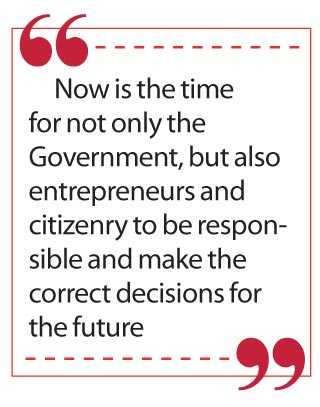
Wegapitiya expressed his opinion based on the fact that 52% of the employment is created by SMEs. He said restriction of movement and demand shock that have arisen should be considered as opportunities. He urged entrepreneurs to look at the new trends of engagements that have been there in the past 2 months since the lockdown. Mobile solutions, digitalisation, healthcare, import substitution and agro business have come to the forefront, and it is in these that the opportunities lie.
In response to question if the companies cannot operate in their full capacity, how the cost of production can be managed, Kumarasinghe revealed that even while running in lesser capacity, he has diverted to products that are the need of the day, such as hand sanitiser and sanitation liquids. He also noted that onions and dry chilies have been imported to Sri Lanka, and at the halt of these imports, there is a strong potential business.
With regard to the question of whether the Government took the right steps during the COVID-19 pandemic and mitigation, Wegapitiya said all need to appreciate the unconventional political leadership which helped to contain the situation. “Sri Lankan economy was not doing well anyway. It is an import-dependent economy with a small export basket and many issues in the GDP. Crafting a new strategy is the need of the day. To do this, old policies should be left behind,” he said.
The panellists were then inquired as to how financially resourceful the local entrepreneurs are to take up the challenge. Dehigama was of the opinion that though moratoriums are available, it is wise to handle the situation without getting into excessive debt. There is a 35-40% trade decline, hence the pitch is not the best to bask in further borrowing. It is better to adopt a cost cutting strategy. Layoffs would seem the easy thing to do, but the role of the entrepreneur is not to layoff but to create employment. Adopt diversified channels that lead into novel revenue pathways. Train the existing employees on these new revenue channels without laying them off. Create new local trends such as local food, local travel destinations and local races.
When inquired as to whether there is a necessity in the post COVID-19 economic and business environment for the companies to merge, Kumarasinghe cited banks as a clear example of the failed European economic model, and therefore do not support local entrepreneurs properly.
“Moratoriums add up interest and by doing that banks make profit out of this calamity,” he alleged. For the question what their single advice to the Government would be, Wegapitiya replied that he would urge the Government to properly govern. Kumarasinghe appreciated that the Government is exercising control on unnecessary opening up of the economy and that it was important to support and cooperate with the Government. He stated the excessive millions of rupees spent on motor vehicles and fuel and requested to rethink their consumption. Dehigama urged the Government to increase liquidity/cashflow in the economy to revive the economy post-COVID-19.